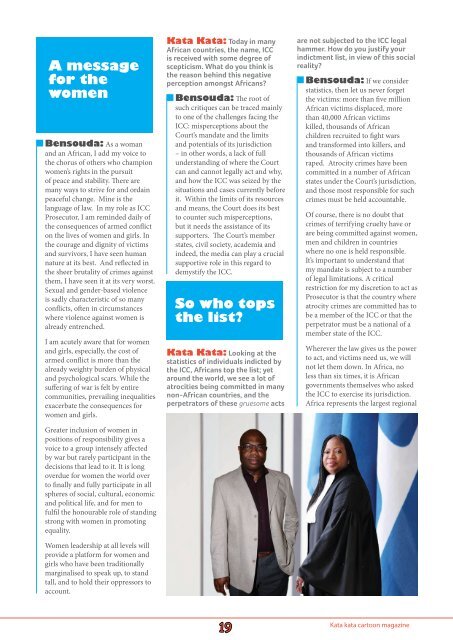2015 EDITION Vol.3 Issue 11 DIGITAL
You also want an ePaper? Increase the reach of your titles
YUMPU automatically turns print PDFs into web optimized ePapers that Google loves.
A message<br />
for the<br />
women<br />
Bensouda: As a woman<br />
and an African, I add my voice to<br />
the chorus of others who champion<br />
women’s rights in the pursuit<br />
of peace and stability. There are<br />
many ways to strive for and ordain<br />
peaceful change. Mine is the<br />
language of law. In my role as ICC<br />
Prosecutor, I am reminded daily of<br />
the consequences of armed conflict<br />
on the lives of women and girls. In<br />
the courage and dignity of victims<br />
and survivors, I have seen human<br />
nature at its best. And reflected in<br />
the sheer brutality of crimes against<br />
them, I have seen it at its very worst.<br />
Sexual and gender-based violence<br />
is sadly characteristic of so many<br />
conflicts, often in circumstances<br />
where violence against women is<br />
already entrenched.<br />
I am acutely aware that for women<br />
and girls, especially, the cost of<br />
armed conflict is more than the<br />
already weighty burden of physical<br />
and psychological scars. While the<br />
suffering of war is felt by entire<br />
communities, prevailing inequalities<br />
exacerbate the consequences for<br />
women and girls.<br />
Greater inclusion of women in<br />
positions of responsibility gives a<br />
voice to a group intensely affected<br />
by war but rarely participant in the<br />
decisions that lead to it. It is long<br />
overdue for women the world over<br />
to finally and fully participate in all<br />
spheres of social, cultural, economic<br />
and political life, and for men to<br />
fulfil the honourable role of standing<br />
strong with women in promoting<br />
equality.<br />
Women leadership at all levels will<br />
provide a platform for women and<br />
girls who have been traditionally<br />
marginalised to speak up, to stand<br />
tall, and to hold their oppressors to<br />
account.<br />
Kata Kata: Today in many<br />
African countries, the name, ICC<br />
is received with some degree of<br />
scepticism. What do you think is<br />
the reason behind this negative<br />
perception amongst Africans?<br />
Bensouda: The root of<br />
such critiques can be traced mainly<br />
to one of the challenges facing the<br />
ICC: misperceptions about the<br />
Court’s mandate and the limits<br />
and potentials of its jurisdiction<br />
– in other words, a lack of full<br />
understanding of where the Court<br />
can and cannot legally act and why,<br />
and how the ICC was seized by the<br />
situations and cases currently before<br />
it. Within the limits of its resources<br />
and means, the Court does its best<br />
to counter such misperceptions,<br />
but it needs the assistance of its<br />
supporters. The Court’s member<br />
states, civil society, academia and<br />
indeed, the media can play a crucial<br />
supportive role in this regard to<br />
demystify the ICC.<br />
So who tops<br />
the list?<br />
Kata Kata: Looking at the<br />
statistics of individuals indicted by<br />
the ICC, Africans top the list; yet<br />
around the world, we see a lot of<br />
atrocities being committed in many<br />
non-African countries, and the<br />
perpetrators of these gruesome acts<br />
are not subjected to the ICC legal<br />
hammer. How do you justify your<br />
indictment list, in view of this social<br />
reality?<br />
Bensouda: If we consider<br />
statistics, then let us never forget<br />
the victims: more than five million<br />
African victims displaced, more<br />
than 40,000 African victims<br />
killed, thousands of African<br />
children recruited to fight wars<br />
and transformed into killers, and<br />
thousands of African victims<br />
raped. Atrocity crimes have been<br />
committed in a number of African<br />
states under the Court’s jurisdiction,<br />
and those most responsible for such<br />
crimes must be held accountable.<br />
Of course, there is no doubt that<br />
crimes of terrifying cruelty have or<br />
are being committed against women,<br />
men and children in countries<br />
where no one is held responsible.<br />
It’s important to understand that<br />
my mandate is subject to a number<br />
of legal limitations. A critical<br />
restriction for my discretion to act as<br />
Prosecutor is that the country where<br />
atrocity crimes are committed has to<br />
be a member of the ICC or that the<br />
perpetrator must be a national of a<br />
member state of the ICC.<br />
Wherever the law gives us the power<br />
to act, and victims need us, we will<br />
not let them down. In Africa, no<br />
less than six times, it is African<br />
governments themselves who asked<br />
the ICC to exercise its jurisdiction.<br />
Africa represents the largest regional<br />
19<br />
Kata kata cartoon magazine

















